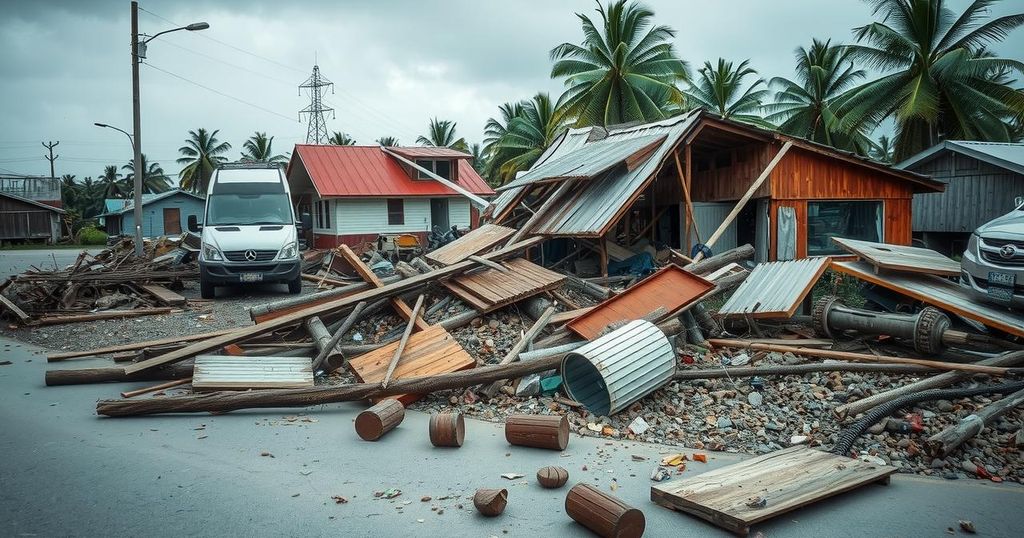Mayotte is reeling from the devastating effects of Cyclone Chido, a Category 4 storm that struck on December 15. With at least fourteen confirmed fatalities and potentially hundreds missing, the cyclone has inflicted catastrophic damage across the territory, particularly in informal settlements. Local officials and residents describe the scene as apocalyptic, signaling an urgent humanitarian crisis. Recovery efforts are hampered by infrastructural destruction and the socioeconomic challenges faced by the population, especially undocumented migrants.
On December 15, the French territory of Mayotte experienced catastrophic destruction due to Cyclone Chido, a climate event that has left the region devastated. Residents described the aftermath as resembling an atomic bomb blast, with authorities confirming at least fourteen deaths, though the local prefect suggested the toll could rise to hundreds, if not thousands. The cyclone, classified as a Category 4 storm, produced winds exceeding 220 kilometers per hour and triggered significant damage to infrastructure, homes, and vital public services across the islands.
The cyclone made landfall in Mayotte after impacting northern Madagascar, and its intensity marked it as the most severe storm on record for the territory in over 90 years. Reports indicate that entire neighborhoods were flattened, power and communication systems were severely disrupted, and key facilities such as hospitals and schools were compromised. The damage is particularly acute in informal settlements, where many residents are undocumented migrants lacking access to basic services.
Local officials are faced with challenges in rescuing those affected due to impassable roads and breakdowns in communication. As efforts commence to provide aid, it remains difficult to ascertain the true extent of casualties, with much of the island currently unreachable. The ongoing efforts to locate survivors have been hampered by fears among undocumented individuals of deportation should they seek assistance.
On the ground, residents reported a dire lack of resources, with some citizens noting, “We have no electricity, no water, we’ve been in the dark for three days.” French authorities have deployed military personnel and rescuers to assist in recovery operations, though the situation remains precarious. Cyclone Chido is part of a broader trend where climate change exacerbates the severity of tropical storms, emphasizing the need for enhanced global awareness and preventive measures.
Overall, this disaster highlights the vulnerabilities faced by Mayotte, a territory burdened by poverty and migration issues, underscoring the urgent need for humanitarian aid and infrastructural support.
Mayotte, a French overseas territory in the Indian Ocean, is composed of two main islands and lies north of Madagascar. It is known for its socio-economic challenges, being the poorest region in the European Union. The recent Cyclone Chido, which struck on December 15, was identified as a Category 4 storm, indicating a significant level of threat typically associated with strong hurricanes. The cyclone has illuminated the critical issues related to climate resilience, disaster preparedness, and the socio-economic vulnerabilities faced by the population, including many undocumented migrants who constitute a substantial part of the community. The frequency and intensity of cyclones have been increasing, which many scientists attribute to climate change and its impact on ocean temperatures and atmospheric conditions.
In conclusion, Cyclone Chido’s unprecedented impact on Mayotte serves as a stark reminder of the growing risks posed by extreme weather events, particularly in vulnerable regions. The destruction has led to a humanitarian crisis, with local authorities and international aid organizations grappling to respond effectively. The need for long-term strategies to enhance climate resilience and improve living conditions in Mayotte is more pressing than ever, as the region copes with the aftermath of this devastating cyclone.
Original Source: www.accuweather.com







